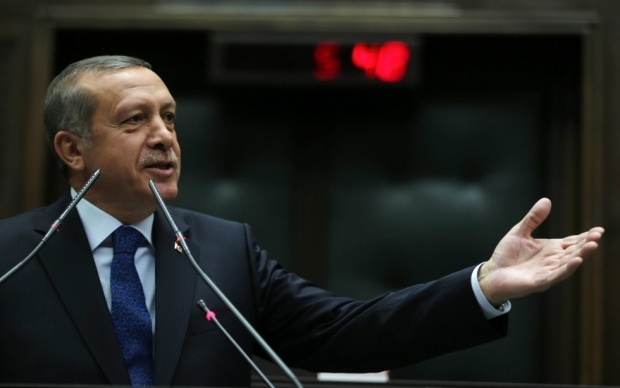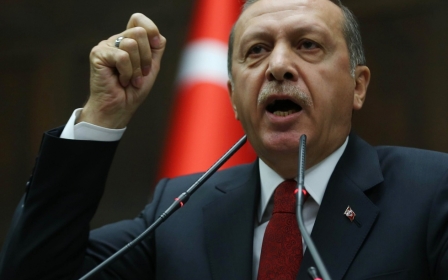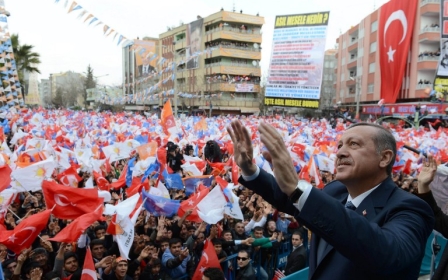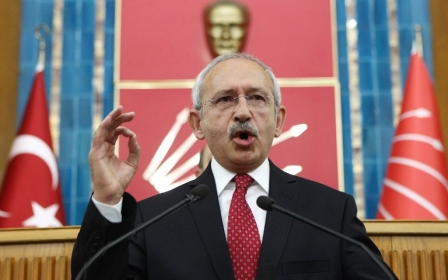Turkey's Erdogan headed for presidency

Turkey's Prime Minister Recep Tayyip Erdogan is expected to announce his candidature for presidential elections in August.
Erdogan is already in his third term as prime minister, the maximum permitted under his Justice and Development Party (AKP)'s rules.
The party is not expected to name its candidate for two more weeks, but many expect Erdogan to be AKP's choice for a presidential candidate.
"You know who it is. Don't make me say it," deputy prime minister Bulent Arinc told journalists on Sunday.
But the August election - the first time Turks will directly elect their head of state - comes at a fraught time for Erdogan and Turkish society.
The past year has seen anti-government protests on an unprecedented scale, a huge corruption allegations and an angry response to a mining disaster.
Erdogan can still rely on massive support from pious supporters particularly in rural areas, amongst others.
And while a few other names have circulated for the presidency - including deputy prime ministers Ali Babacan and Besir Atalay, and intelligence chief Hakan Fidan - all are Erdogan loyalists.
None are expected to present a serious challenge to Erdogan, who remains hugely popular after an 11-year rule in which he has tamed the military, returned Islam to public life and overseen rapid economic growth.
New kind of president
Erdogan's temperament is likely to ensure that the presidential post becomes more than ceremonial.
"It will not be a president of protocol, but one that sweats, runs around, works hard," Erdogan said in April.
But while the current president, Abdullah Gul, tried to be a unifying force, Erdogan's refusal to placate his critics could have the opposite effect.
He pointed the finger at a widespread conspiracy plot by his erstwhile ally Fethullah Gülen, an exiled cleric with widespread influence in Turkey's security forces and bureaucracy.
Erdogan liberally threw labels such as "terrorists" and "traitors" at them.
But Erdogan's critics have done little to damage his overall popularity, ensuring another landslide victory for his party at local elections in March.
"Erdogan has invested hugely in his 'friend-or-foe' strategy since the beginning of last year's mass protests. He wanted to show his supporters that he is a strong leader protecting the country against all enemies," Fethi Acikel, a political scientist at the University of Ankara, told AFP.
"I don't see him giving up this strategy which has proved so successful at the ballot box, but has severely dented Turkey's image at home and abroad," he said.
Police last week cracked down on demonstrators in Istanbul and Ankara. Thousands had gathered to mark the first anniversary of environmental protests in Gezi Park, which spiralled into broader rallies against Erdogan in other areas in the country.
No presidential candidates announced
But many hope Erdogan will use the presidency to ease the political tensions and reach out across the political divide.
No candidates from any party have been put forward yet to run for the post.
Turkey's Nationalist Movement Party's (MHP) leader Devlet Bahceli said that everyone has the right to be the president.
MHP has previously said that they wished to present a joint candidate, with other opposition parties, that can "embrace the entire nation". The party is meeting with other political parties, non-governmental organizations and trade bodies to discuss who they will nominate.
Candidates for the August 10 presidential election can submit their applications to the country's election authority from June 29 to July 3.
A candidate needs more than 50 percent of the popular vote to be elected in the first round. If no one receives the required percentage, there will be a second round on August 24 between the two candidates who received the most votes in the first.
The period leading up to the elections has been fraught with difficulty for Erdogan. On Tuesday a controversial YouTube ban his government put in place two months ago was reversed after 67 days of the government blocking the website. This came after the High Court ruled on 29 May that the ban violated the Turk’s right to free speech.
Tuesday also saw the release of most, if not all, of the protesters who were arrested on Saturday 31 May at the one year anniversary protests at Gezi Park. Sources differ as to the exact number of detained released.
New MEE newsletter: Jerusalem Dispatch
Sign up to get the latest insights and analysis on Israel-Palestine, alongside Turkey Unpacked and other MEE newsletters
Middle East Eye delivers independent and unrivalled coverage and analysis of the Middle East, North Africa and beyond. To learn more about republishing this content and the associated fees, please fill out this form. More about MEE can be found here.




